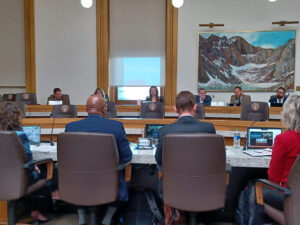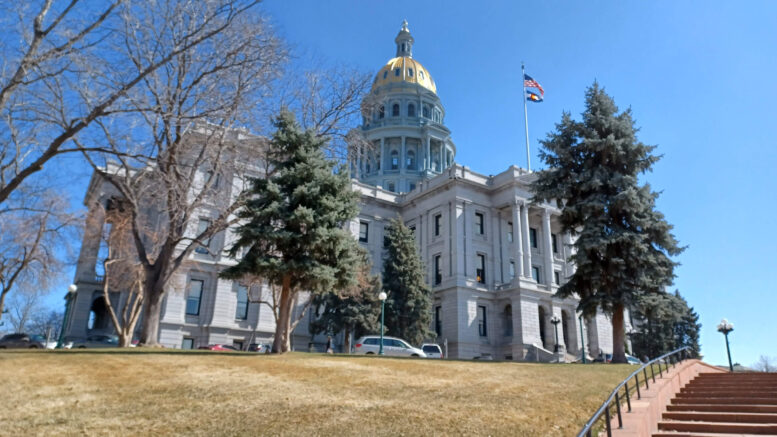Utility watchdog groups suggested proposals for cutting customer rates Monday that ranged from eliminating incentives for hooking new homes up to gas lines to requiring them to share some of the costs they pay for natural gas rather than passing all those costs to customers.
The proposals came at the third meeting of the Joint Select Committee on Rising Utility Costs, a panel put together by legislative leaders to probe ways to protect customers hit by skyrocketing international natural-gas prices and increased gas usage during this cold winter. After two hearings in which legislators grilled utilities regulators and then the utilities themselves, they turned their attention this week to outside groups to ask what can be done.
The groups speaking to committee members pointed to limits on utility spending that already in place in other states as well as to limits they said Colorado should consider on incentives that have been long-standing here. But one week after utility leaders warned the committee that significant changes to their ability to recoup return on their investments could lead to problems with the reliability of their systems, four groups all disagreed, saying there is more that can be done to protect ratepayers.
Remove incentives for gas infrastructure
Meera Fickling, senior climate policy analyst for climate-focused nonprofit Western Resource Advocates, argued that the Public Utilities Commission should be given more power to limit the buildout of natural-gas infrastructure that’s led to increases in utilities’ base rates. Xcel Energy-Colorado President Robert Kenney told the committee last week that the pipelines could be repurposed for renewable natural gas or hydrogen as natural-gas demand falls in the future, but Fickling said that will be too difficult and the fuels will remain too expensive.
Arguing that there needs to be more intersection between utilities’ infrastructure planning and the state’s climate plan, Fickling said the state could bar line-extension allowances from utilities that cut about one-third of developers’ costs of connecting buildings to nearby pipelines. By requiring developers to pay the full cost rather than letting the utility recover one-third of the costs from its customer base, that could shift the cost of about $970 per new home, she said.
Doing this would force the utilities to look at alternatives to gas-infrastructure expansion, from electric-line expansion to smart-grid systems to weatherization to cut overall power usage, Fickling said. And in that vein, legislators could also look at banning utilities from offering incentives for customers to purchase more efficient gas-powered appliances, instead limiting such incentives to electric-powered appliances.
“At a minimum, we need to stop incentivizing or subsidizing adding new customers to the gas system, which is driving this infrastructure expansion,” Fickling said, noting that Xcel’s investment in infrastructure doubled over the past 10 years.
Natural gas pass-through costs
Colorado political leaders, including Gov. Jared Polis, have said that the state needs to move more quickly away from natural gas to renewable energy. However, leaders from Xcel and Black Hills Energy emphasized last week that even if more people choose to get energy from sources like solar and heat pumps, natural gas will be needed as a fuel for a long time.

The Joint Select Committee on Rising Utility Rates questions a panel of leaders from Xcel Energy and Black Hills Energy during a March 14 hearing.
For roughly 50 years, utilities have been able to pass through to customers the cost of fuels such as natural gas, which allows them to reduce their risks during times when the prices of such fuels are volatile. But Albert Lin, executive director of Pearl Street Station Finance Lab, said that practice has the effect of motivating utilities not to look for efficiencies or innovation in how they deliver power to customers by letting them shift all the risk for their largest and most volatile cost to another party.
Lin and another official from the organization that analyzes financial motivations within the utility sector suggested that utilities could be made to share a small amount of natural-gas cost hikes — say, 5% or so — to find cost savings in how it is delivered.
“The system will get more efficient in the process,” he said.
Limit spending of ratepayer revenues?
David Pomerantz — executive director of the San Francisco-based Energy and Policy Institute, which documents behavior by utilities that may be contrary to interests of their investors or of the environment — said the PUC could further limit how utilities spend ratepayer revenue. And in doing so, he revived a topic that Senate President Steve Fenberg, the Boulder Democrat who is chairing the special committee, brought up several times over the first two meetings.
New York, for example, has banned utilities from spending ratepayer revenue on trade associations that sometimes lobby or run political-style campaigns for certain policies, while Colorado does not, Pomerantz said. Connecticut, meanwhile, is considering banning utilities from spending such revenue on legal experts and consultants to help them justify proposed rate hikes to the PUC — a practice that is allowed among Colorado utilities.
“Utilities don’t always employ best practices for cost containment, such as their legal expenses,” Pomerantz said.
Fenberg said the committee now will pause its weekly meetings to consider what its next steps may be. Many observers expect members to suggest changes that could be put forward as bills before the end of the 2023 legislative session.
